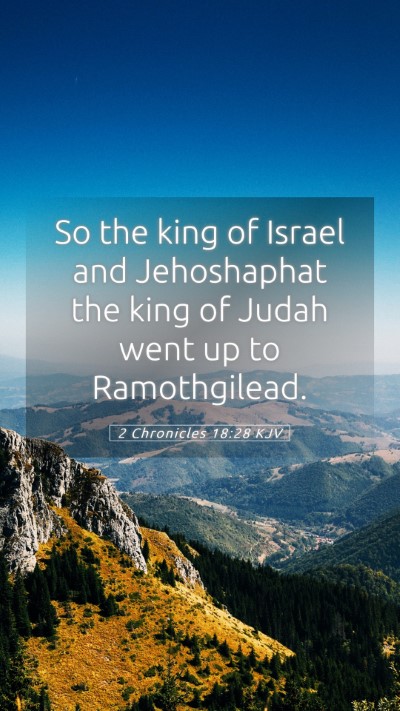Understanding 2 Chronicles 18:28
2 Chronicles 18:28 states: "So the king of Israel and Jehoshaphat the king of Judah went up to Ramoth-gilead." This verse serves as a pivot in the narrative of the battle between Israel and Syria, highlighting the alliance between two kings and their pursuit of military strategy.
Bible Verse Meanings and Interpretations
The verse encapsulates significant themes such as alliance, leadership, and warfare. Let's explore insights provided by well-respected public domain commentaries.
Matthew Henry's Commentary
Matthew Henry emphasizes the importance of alliances in this passage. He notes that while these kings united for battle, their motivations often diverged, signifying the potential pitfalls of political and military partnerships. The context of their alliance against a common enemy - the king of Syria - reflects on both their strengths and their weaknesses. Henry stresses the importance of seeking divine guidance in such endeavors, warning against a union that lacks spiritual foundation.
Albert Barnes' Notes on the Bible
Albert Barnes provides a historical perspective, illustrating the significance of Ramoth-gilead as a strategic location in the conflict. He explicates that this verse illustrates the folly of Ahab's reliance on false prophets and worldly counsel over God's word. Barnes encourages readers to look at the outcomes of these kings' decisions, suggesting that their choices had dire consequences not just for themselves, but for their nations as well.
Adam Clarke's Commentary
Adam Clarke delves into the character of both kings. He describes Ahab as a ruler whose ambition blinds him to the moral implications of his actions. Conversely, Jehoshaphat is portrayed as a more righteous king, yet one who is led into questionable alliances. Clarke warns readers about the dangers of compromising one's values in pursuit of political gain. He suggests that the narrative invites reflection on one's alignment with those who may not share the same moral compass.
Scripture Analysis and Biblical Exegesis
This verse not only serves as a historical account but also as a lesson on the significance of divine guidance in leadership. The union between the two kings is emblematic of the conflicting natures of their reigns: while one is driven by greed and power, the other seeks righteousness yet can be misled. Understanding this duality gives insights into the complexities of human relationships—especially in leadership.
Key Themes from 2 Chronicles 18:28
- Alliance and Partnership: The formation of alliances should be approached with caution and divine insight.
- Consequences of Leadership: Leaders' decisions impact not just themselves but their nations and followers.
- Moral Compass: Maintaining one's values in leadership is essential to avoid negative outcomes.
- Role of Prophecy: Failing to heed true prophecy can lead to poor judgment and tragic consequences.
Applying 2 Chronicles 18:28 to Daily Life
The lessons drawn from this verse encourage individuals to reflect on the nature of their alliances and partnerships in everyday life. Whether in personal relationships, business, or community involvement, seeking wisdom and considering moral implications is crucial.
Related Bible Cross References
- 1 Kings 22:1-4: Elaborates on the context of Ahab and Jehoshaphat’s alliance.
- 2 Chronicles 20:35-37: Discusses the aftermath of Jehoshaphat’s alliances.
- Proverbs 13:20: Highlights the wisdom of choosing companions carefully.
- 2 Corinthians 6:14: Suggests the importance of not being unequally yoked with unbelievers.
Conclusion
In summary, 2 Chronicles 18:28 is rich with meaning that can guide personal and spiritual reflections. It serves as a reminder to seek wisdom in alliances and to remain steadfast in moral integrity. Understanding the historical context through commentaries reveals deeper insights into leadership, decision-making, and spiritual discernment.
For those engaged in Bible study, this verse offers a fertile ground for discussion, emphasizing the importance of seeking Bible study resources that provide sound biblical interpretations and commentary.


